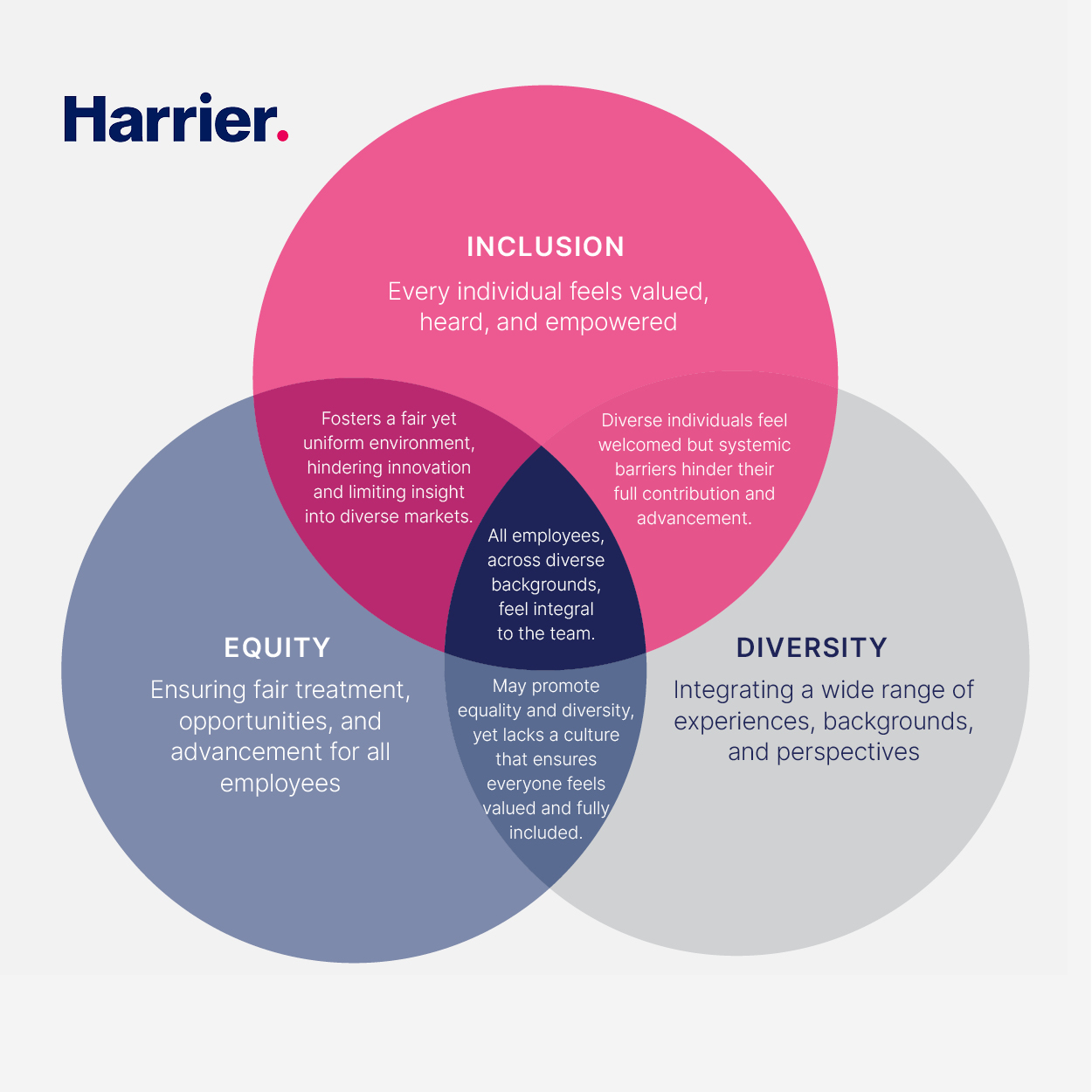The ABC's of Authentic DEI (Diversity, Equity and Inclusion)
- Learn how your business can benefit from authentic DEI principles to enrich organisational culture and operational effectiveness.
- Understand how co-creating DEI policies with employees from diverse backgrounds can unlock untapped potential and drive innovation in the workplace.
- Find out how to effectively measure the impact of your DEI initiatives, focusing on the qualitative experiences of your employees alongside quantitative metrics.
- Understand why it’s important to have all 3 initiatives – Diversity, Equity and Inclusion – planned for in your talent strategy.

In recent years, the corporate world has witnessed a surge in discussions around Diversity, Equity, and Inclusion (DEI). However, amidst a sea of generic content and symbolic gestures, the question remains: How many organisations truly embed these values into their daily practices? The era of token diversity days, empty rhetoric, and checkbox exercises is outdated. It's time to redefine DEI policies to be genuinely inclusive, impactful, and integrated into the fabric of organisational culture.
The Pitfall of Performative DEI
Tokenism in DEI is often characterised by superficial efforts: celebrating diversity on designated calendar days, sporadic events, or meeting representation quotas without deeper engagement. Such practices can lead to a complacent culture, where the real issues of inequity and exclusion are glossed over. Authentic DEI requires a shift from performative actions to meaningful strategies.
The Blueprint for Authentic DEI Policies
- Leadership Commitment and Accountability: The journey towards authentic DEI starts at the top. Leadership must not only voice support but also demonstrate commitment through accountable actions. This includes setting clear DEI goals, measuring progress, and integrating DEI into the core business strategy.
- Inclusive Policy Development: DEI policies should be co-created with employees from diverse backgrounds. This participatory approach ensures that the policies are not just top-down mandates but are shaped by the experiences and needs of all staff members.
- Continuous Education and Training: Education is key to fostering an inclusive environment. Regular, in-depth training sessions on unconscious bias, cultural competency, and inclusive communication can empower employees to understand and embrace diversity.
- Comprehensive Recruitment and Advancement Strategies: Move beyond quotas to establish recruitment practices that reach diverse talent pools. Additionally, focus on equitable advancement opportunities to ensure that diversity is reflected at all levels, especially in leadership roles.
- Regular DEI Audits and Feedback Mechanisms: Implementing a DEI policy is not a one-time event. Regular audits, surveys, and feedback channels help in continuously assessing the effectiveness of DEI initiatives and making necessary adjustments.
- Inclusion in Everyday Practices: DEI should be an integral part of everyday business operations. This includes inclusive meeting practices, equitable project assignments, and recognition of diverse holidays and cultural events as part of the normal business calendar.
- Support for Employee Resource Groups (ERGs): ERGs are employee-led groups based on shared characteristics or life experiences. Supporting these groups can provide a platform for underrepresented voices and foster a sense of belonging.
- Transparent Communication: Regularly communicate the organisation's DEI goals, initiatives, and progress to all stakeholders. Transparency builds trust and demonstrates a genuine commitment to DEI.
Why Diversity, Equity, and Inclusion Must Coexist
Implementing Diversity, Equity, and Inclusion (DE&I) is essential for a supportive and innovative workplace. Diversity brings varied backgrounds and ideas, enhancing creativity. Equity ensures equal opportunities by tackling systemic barriers. Inclusion makes everyone feel valued, boosting their contributions. Lacking any aspect disrupts balance: without inclusion, diversity feels superficial, reducing teamwork and output; without equity, efforts towards diversity and inclusion can't overcome inherent inequalities, blocking fair participation. These three elements are vital for a harmonious, productive environment, and are key to an organisation's growth and sustainability.

Measuring the Impact of DEI Policies
The effectiveness of DEI policies should be measured not just in numbers but in the lived experiences of employees. Metrics such as employee satisfaction, retention rates, and advancement of underrepresented groups are crucial. Additionally, qualitative feedback through employee surveys and forums provides insights into the real impact of these policies.
In Closing: A Call for Sustained Effort
Creating authentic DEI policies is a continuous journey, not a destination. It requires sustained effort, commitment, and a willingness to learn and adapt. By moving beyond tokenism and embracing genuine, everyday practices that foster diversity, equity, and inclusion, companies can not only enrich their work culture but also drive meaningful social change.
In a world where diversity is a reality but inclusion is a choice, let's make the choice that enriches our workplaces and society at large.

